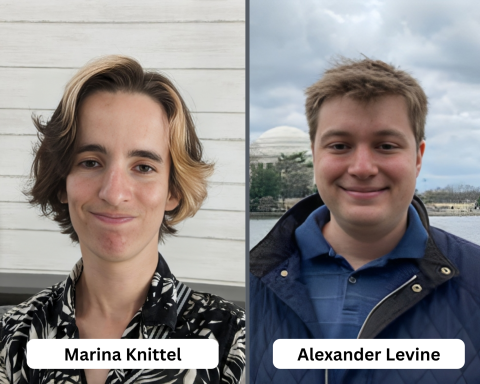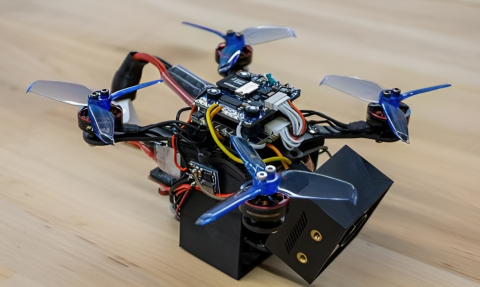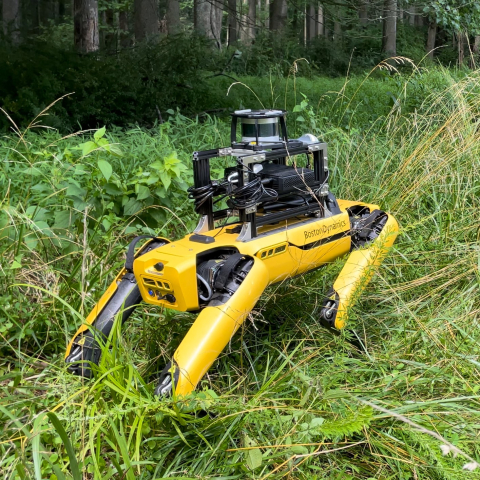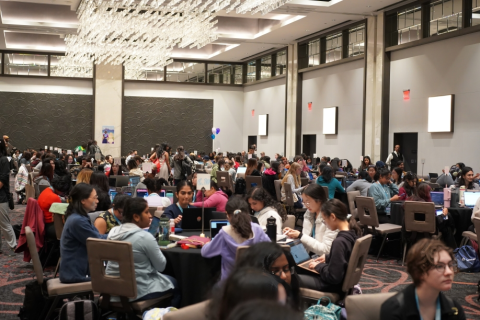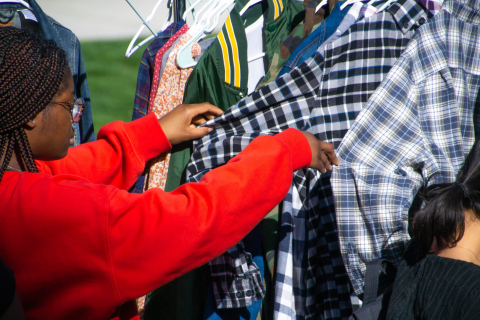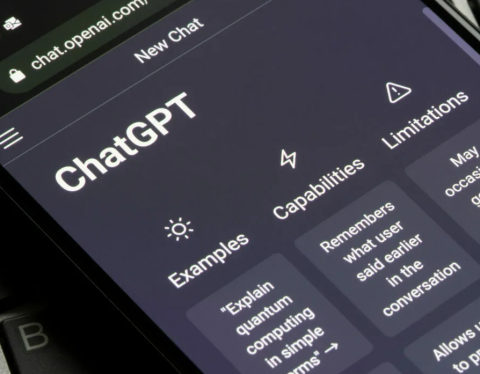Recent News & Accomplishments
2023
Marina Knittel and Alexander Levine each received the award for the 2023–24 academic year.
The Department of Computer Science at the University of Maryland announced its winners of the Larry S. Davis Doctoral Dissertation Award for 2023-24, an annual honor distinguishing the department's two outstanding doctoral dissertations. This year's recipients are Marina Knittel , who plans to graduate this semester and begin a postdoctoral fellowship at UC San Diego in January, and Alexander Levine (Ph.D. '23, computer science), currently a postdoctoral fellow at the University of Texas at Austin. The award highlights exceptional dissertations noted for their technical depth, significance,... read more
The workshop helped to unite researchers from multiple disciplines to explore the future of technology research and foster collaboration.
General-purpose generative models are the massive, big-data-driven systems powering new and exciting artificial intelligence technology. These systems use large language models, complex algorithms and neural networks to produce original text, audio, synthetic data, images and more. However, the impressive performance of these models comes at a cost. They require significant data, computational power, and storage, creating a barrier to entry, especially for smaller research groups. The hype around large pre-trained models (LPMs)—a deep learning model that is trained on large datasets to... read more
UMD alum and Worcester Polytechnic Institute faculty member Nitin Sanket is creating a tiny drone that could help pollinate plants.
This summer’s weather extremes were stark reminders that climate change is not only real, it’s here. Less visible to most of us than smoke-filled skies, water-logged roads and life-threatening heat—but just as important—is the dramatic and ongoing decline of global bee populations. Many crops rely on commercially managed honeybees, wild native bees and other pollinators to reproduce. In fact, one-third of every bite of food we eat comes from plants that need to be pollinated, so pollinator health affects all of us. But almost 35 percent of insect pollinator populations worldwide are at risk... read more
This comprehensive project is committed to advancing cutting-edge technologies in various domains, such as engineering, robotics and cybersecurity.
ArtIAMAS , a pioneering five-year collaborative initiative between researchers from the University of Maryland, the University of Maryland Baltimore County and the US Army Research Lab (ARL), is now entering its third year of the program. This comprehensive project is dedicated to advancing cutting-edge technologies across diverse domains including engineering, robotics, computer science, operations research, modeling and simulation and cybersecurity. These technologies are meticulously designed to operate autonomously while seamlessly complementing human capabilities. The UMD Gamma Lab , led... read more
Many of the leading artificial intelligence companies are already incorporating watermarking tech into their products. Some are simple and easily cropped, like OpenAI’s marking on DALL-E images, but others are more persistent. In August, for instance, Google announced the beta version of SynthID, an imperceptible watermark inserted directly into the pixels of an image. The method avoids degrading or prominently marking the image while allowing AI detection software to authenticate it even after it’s cropped or resized. These “high perturbation” methods of embedding digital watermarks into the... read more
Zhang, an affiliate assistant professor in the Department of Computer Science, incorporates his passion for games into his research approach.
Competing to win—whether it’s a video or board game—requires the player to be strategic and see the bigger picture. They need to understand the other players’ positions and strengths in order to be successful. This is how Kaiqing Zhang —a self-described games enthusiast—approaches his research, which lies at the intersection of machine learning, reinforcement learning, game theory, and control theory. “Specifically, I am interested in problems in machine learning when there are multiple learners interacting with each other, and in building theoretical foundations for it,” says Zhang, an... read more
Since its launch in 2015, the student-led event for coding and computing enthusiasts quickly distinguished itself from typical hackathons.
The Hotel at the University of Maryland, conveniently located across Baltimore Ave. from the Brendan Iribe Center for Computer Science and Engineering, transformed into a dynamic hub of innovation and creativity on October 21 and 22, 2023, hosting the 9th annual Technica hackathon. This event, which is the world's largest hackathon for underrepresented genders, brought together tech enthusiasts from across the globe to celebrate and showcase their talents. Since Technica’s inception in 2015 as a free, student-run event for anyone interested in coding and computing—even those without prior... read more
The award recognizes and funds innovative projects that push the boundaries of foundational models and their potential applications.
University of Maryland Assistant Professor of Computer Science Furong Huang received the Microsoft Accelerate Foundation Models Research award for her work titled "Building Foundation Models for Efficient Finetuning or Zero-Shot Learning of Sequential Decision-Making." The award recognizes and funds innovative projects that push the boundaries of foundational models and their potential applications. Winners like Huang can receive up to $20,000 in Azure credits, equipping them with powerful tools to further their research endeavors. "I am deeply honored to receive the Microsoft Accelerate... read more
The platform offers direct chats for streamlined buyer-seller communications on pre-owned items.
Swipe right for yes and left for no. Vyne , an app launched earlier this month by two University of Maryland students, combines this familiar dating app approach with thrifting. The app, exclusively available at UMD, allows students to snap a picture of an item they’d like to sell before potential buyers swipe left or right until they discover items they’d like to purchase. Once they swipe right, they enter a chat with the seller where they can discuss the item and sale. Co-founders Shaurya Saran and Vaughn Hatfield, both junior computer science majors, love to thrift but realized other... read more
Professor Emeritus Ben Shneiderman discusses the role of accountants in the expanding realm of AI with Politico.
In search of ideas for ensuring a safe future with increasingly powerful AI, people have looked to lawmakers, coders, scientists, philosophers and activists. They may be overlooking the most important inspiration of all: Accountants. New polling shared first with DFD finds that a wonky policy idea enjoys surprising popularity among American adults: requiring mandatory safety audits of AI models before they can be released. Audits as a way to control AI don’t literally involve accountants; they’re an evolving idea for how to independently assess the risks of a new system. Like financial audits... read more
